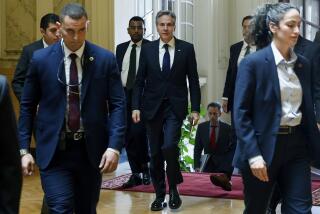Bush Team ‘to Move Forward Aggressively’ on Mideast Talks
- Share via
NEW YORK — The Bush administration is hoping to revive the moribund Middle East peace process with a new declaration of principles for a regional settlement, Israeli and Palestinian officials said Sunday, after Secretary of State Colin L. Powell held separate meetings here with Palestinian leader Yasser Arafat and Israeli Foreign Minister Shimon Peres.
American diplomats here offered no details of the planned initiative, but Powell said the United States plans “to move forward aggressively” in promoting talks and a halt to the violence in the region. He told reporters that the Israelis and Palestinians both feel “a new urgency” to return to the negotiating table.
“We are looking forward to opportunities to become more actively engaged,” Powell said.
Palestinian officials expressed gratitude for President Bush’s call at the United Nations on Saturday for the establishment of an independent state of Palestine, and particular appreciation for what Powell acknowledged was a deliberate decision to use that term.
“If one is moving forward with a vision of two states side by side, it’s appropriate to call those states what they will be, Israel and Palestine,” Powell said Sunday on NBC’s “Meet the Press.” The Palestinians themselves and countries that have extended diplomatic recognition to Arafat’s government-in-waiting have long used the word Palestine, but no American president had ever publicly used the term.
“I would like to express my deepest appreciation for President George W. Bush and his declaration in his statement yesterday about the necessity of achieving a just peace based on . . . a two-state solution--Israel and Palestine,” Arafat told the General Assembly on Sunday.
Still, Palestinian officials remain deeply disgruntled by Bush’s refusal to meet personally with the Palestinian leader.
Arafat’s advisors said the Bush administration needs to get more deeply involved in the quest to calm the Middle East conflict. “We are encouraged, but we need more encouragement,” said Yasser Abed-Rabbo, the information minister for the Palestinian Authority.
Peres, after a morning meeting with Powell, said the U.S. State Department is now preparing a “declaration of principles” for the resumption of peace talks, based on a formula recommended by an international panel led by former Sen. George J. Mitchell of Maine.
Nabil Shaath, the Palestinian planning minister, said in an interview here that the Palestinians also have been told to expect a new American “declaration” on the broad terms of a possible settlement. The statement could come out within two weeks, he said.
“Everybody knows that it is critical to deal with the Palestinian issue,” Shaath said. “It’s not just for us. The whole Arab world needs help on this. Pakistan needs help on this.”
Israel and the Palestinian Authority have already theoretically embraced the tenets of the American-sponsored Mitchell plan for a clampdown on violence and resumption of talks, but efforts to put the plan in motion with a cease-fire have failed.
Arafat, in his U.N. speech, promised to “exert every possible effort” to get negotiations back on track. Speaking later in Arabic at a United Nations reception, as scores of delegates lined up to shake his hand, Arafat said sardonically: “We are asking for the impossible: the implementation of all the agreements that we have already signed.”
At the General Assembly, Arafat joined other world leaders in denouncing the Sept. 11 attacks on the World Trade Center and the Pentagon, terming them “horrific, criminal and ugly terrorist acts.” But he devoted much of his speech to denouncing what he called the “state-organized terror” of Israel’s armed forces, accusing Israel of conducting a campaign of assassinations and “ethnic cleansing” in Palestinian territory and countenancing the “killing of women, children and the elderly.”
He did not directly address the issue of suicide bombings and other attacks by Palestinian militants against Israeli civilians. And, in contrast to some other Middle Eastern leaders, he did not pledge support for a financial crackdown on global terrorist networks as demanded by the U.N. Security Council.
Condoleezza Rice, Bush’s national security advisor, on Sunday repeated administration demands that the Palestinian Authority do more to detain and deter terrorists as a prelude to any resumption of peace talks.
“We need to see action from Chairman Arafat and the Palestinian Authority,” Rice said on ABC-TV’s “This Week.” “Until there is a real effort at the cessation of terrorism, it’s going to be very hard to get the peace process going.”
More to Read
Get the L.A. Times Politics newsletter
Deeply reported insights into legislation, politics and policy from Sacramento, Washington and beyond. In your inbox three times per week.
You may occasionally receive promotional content from the Los Angeles Times.










